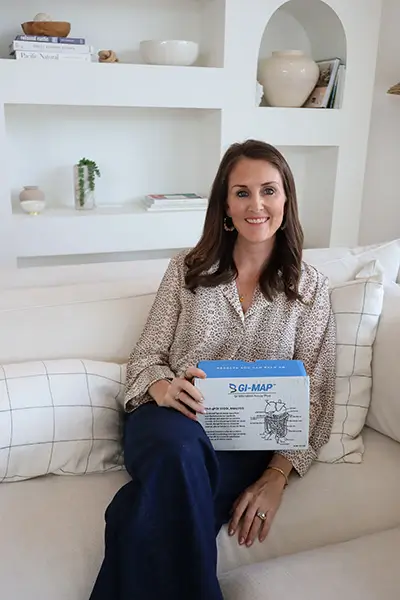This post contains affiliate links which means that if you make a purchase, I do make a small commission, but at no cost to you. Thanks for supporting my work!
If you’ve tried everything for your gut and still feel constipated, bloated, and exhausted, you’re not alone.
Most women I work with have already experimented with probiotics, digestive enzymes, elimination diets, and supplements before they land in my office. Some have cut out entire food groups, thinking they were the problem. And still, their digestion feels stuck.
For years, I was in the same place. I was constantly bloated, struggled with constipation, and thought food was the enemy. I cycled through elimination diet after elimination diet, hoping something would finally work. Nothing did.
It wasn’t until I ran a full thyroid panel, not just TSH, that I finally understood what was going on. My free T3 was extremely low. Years of stress, undereating, gut infections, and mineral deficiencies had taken their toll.
And here’s the part that so many women are never told: free T3 is essential for gut function. When it’s low, your gut literally can’t repair or move the way it’s supposed to.
The problem? Most doctors either never run Free T3 or they’ll say it “doesn’t matter.” They stop at TSH and sometimes T4, which only tells part of the story. You can have “normal” labs on paper and still feel constipated, bloated, and exhausted if Free T3 is bottomed out.
(btw: did you know you can order your own labs? If you want to run a full thyroid panel feel free to checkout this site. Make sure you order a panel that contains Free T3 and TPO + TgAB antibodies)
That’s why addressing Free T3 is one of the most overlooked steps in resolving constipation. Until you support the body’s ability to make and use this active hormone, your gut will always feel like it’s working against you.
What Is Free T3 and Why It Matters for Your Gut
T3 (triiodothyronine) is the active thyroid hormone. While your thyroid gland produces some T3, the majority comes from conversion with your body transforming T4 (inactive thyroid hormone) into T3.
Free T3 is the portion that’s unbound and available to actually enter your cells and do the work. And what does that work include?
- Repairing your gut lining so nutrients can be absorbed properly
- Regulating motility so food moves at the right pace
- Stimulating digestive enzyme production so you can break down food
- Keeping inflammation in check by maintaining a strong barrier
Without enough free T3, the gut lining becomes weaker, motility slows (leading to constipation), and digestion suffers across the board.
Free T3 and Constipation: How They’re Connected
Constipation is one of the clearest signs that free T3 may be low. Here’s why:
- T3 stimulates smooth muscle contraction. Without it, your intestines don’t get the signal to move food along.
- T3 fuels brush border enzymes. These enzymes break down food at the very end of digestion. Without them, undigested food ferments and slows motility further.
- T3 supports bile flow. Poor bile production makes it harder to digest fats and regulate motility.
When free T3 is low, the result is often sluggish digestion, chronic constipation, and that uncomfortable feeling of never fully eliminating.
This was my exact story. For years I thought I just wasn’t eating the “right” foods, but no matter how many I cut out, my bowels stayed slow. Once I started supporting my thyroid and addressing the reasons my free T3 was so low, everything started moving again…literally.
Why Free T3 Can Be Low
Here’s where things get interesting. Low free T3 isn’t usually because your thyroid gland “forgot” how to work. More often, it’s because your body isn’t converting T4 into T3 efficiently. And that process is deeply tied to gut health, liver function, and minerals.
1. Mineral Deficiencies
Conversion of T4 to T3 requires cofactors like selenium, zinc, iron, and magnesium. If these are depleted, which is something I see consistently on HTMA testing, conversion slows to a crawl.
2. Gut Imbalances
About 20% of T3 is produced by bacterial enzymes in the gut. If your microbiome is out of balance, T3 production drops. And if T3 is already low, your gut lining can’t repair itself, creating a vicious cycle.
3. Liver Overload
The liver is responsible for a large portion of T4 to T3 conversion. If it’s bogged down by inflammation, blood sugar swings, or stress hormones, T3 production plummets.
4. Stress and Reverse T3
Chronic stress, under-eating, or overexercising can push the body to create reverse T3 instead of free T3. Reverse T3 acts like a brake pedal, blocking T3 from working in your cells.
The Bidirectional Pathway
This is the part I wish more women knew: thyroid and gut health are not a one-way street.
- The gut needs T3 to repair and function.
- The gut also helps create T3 through bacterial activity.
- The liver needs to convert T4 into T3.
- Minerals fuel the enzymes that make it all possible.
It’s a feedback loop. When one part struggles, the whole system suffers. This is why focusing only on diet or only on gut protocols so often leaves people stuck. You have to support all the pieces at the same time.
Improve Free T3 Naturally
A client I’ll call “Katie” came to me exhausted, constipated, and bloated. She had tried probiotics, antimicrobials, and restrictive diets without success. Her doctor told her thyroid labs were “normal,” but when we looked deeper, her free T3 was scraping the bottom of the range (ideally we want T3 well at 3.0 at a minimum and hers was 2.3).
Once we supported her minerals, rebuilt her gut lining, and helped her liver do its job, things started changing. Her constipation resolved, her energy improved, and she no longer felt like her body was working against her.
Her story and mine are proof that gut healing doesn’t happen in isolation.
How You Can Support Free T3 Naturally
If constipation and gut issues are hanging around despite all your efforts, here are some places to start:
1. Prioritize Minerals
- Selenium: Brazil nuts, eggs, sardines
- Zinc: oysters, pumpkin seeds, red meat
- Iron: beef, spinach, liver
- Magnesium: leafy greens, avocado, dark chocolate
2. Balance Blood Sugar
At gutTogether we use the PFFC (protein, fat, fiber, color) framework for our clients to support microbiome health and blood sugar balance. We encourage clients to make meals that each have protein, fat, fiber and color. Blood sugar swings can block conversion and increase stress hormones.
3. Support the Liver
- Adequate protein (especially at breakfast)
- Cruciferous veggies to support detox
- Hydration (aim for half your body weight in ounces of water daily)
- B vitamins from whole foods or quality supplements
4. Nurture the Gut
- Include a variety of fiber sources (chia, flax, cooked veggies, resistant starches)
- Use gut-repair nutrients like immunolin or glutamine if needed
- Address hidden infections or imbalances with testing (I use GI-MAP in my practice)
5. Reduce Stressors
Swap high-intensity workouts for strength training or walking. Prioritize sleep. Support your nervous system with minerals, breathwork, or restorative practices.
The Bigger Picture
If you’re constipated, bloated, or exhausted and you’ve been told your thyroid labs are “normal”it may be time to ask a deeper question: what’s happening with my free T3?
For me, it wasn’t until I looked at the full picture: gut, liver, minerals, and thyroid that I started to feel like myself again. And I see the same thing in clients every single week.
This isn’t about chasing labs. It’s about helping your body access the hormones it needs to do the job of repairing, digesting, and moving food the way it was designed to.
Ready to Get to the Root?
If you’ve been stuck in the cycle of constipation, bloating, and “normal” labs that don’t explain how bad you feel, there’s hope.
Inside my gutTogether® program, we look at your gut, thyroid, minerals, and metabolism as one connected system. That’s how real healing happens, not by cutting out more foods or adding random supplements, but by rebuilding the foundation.








